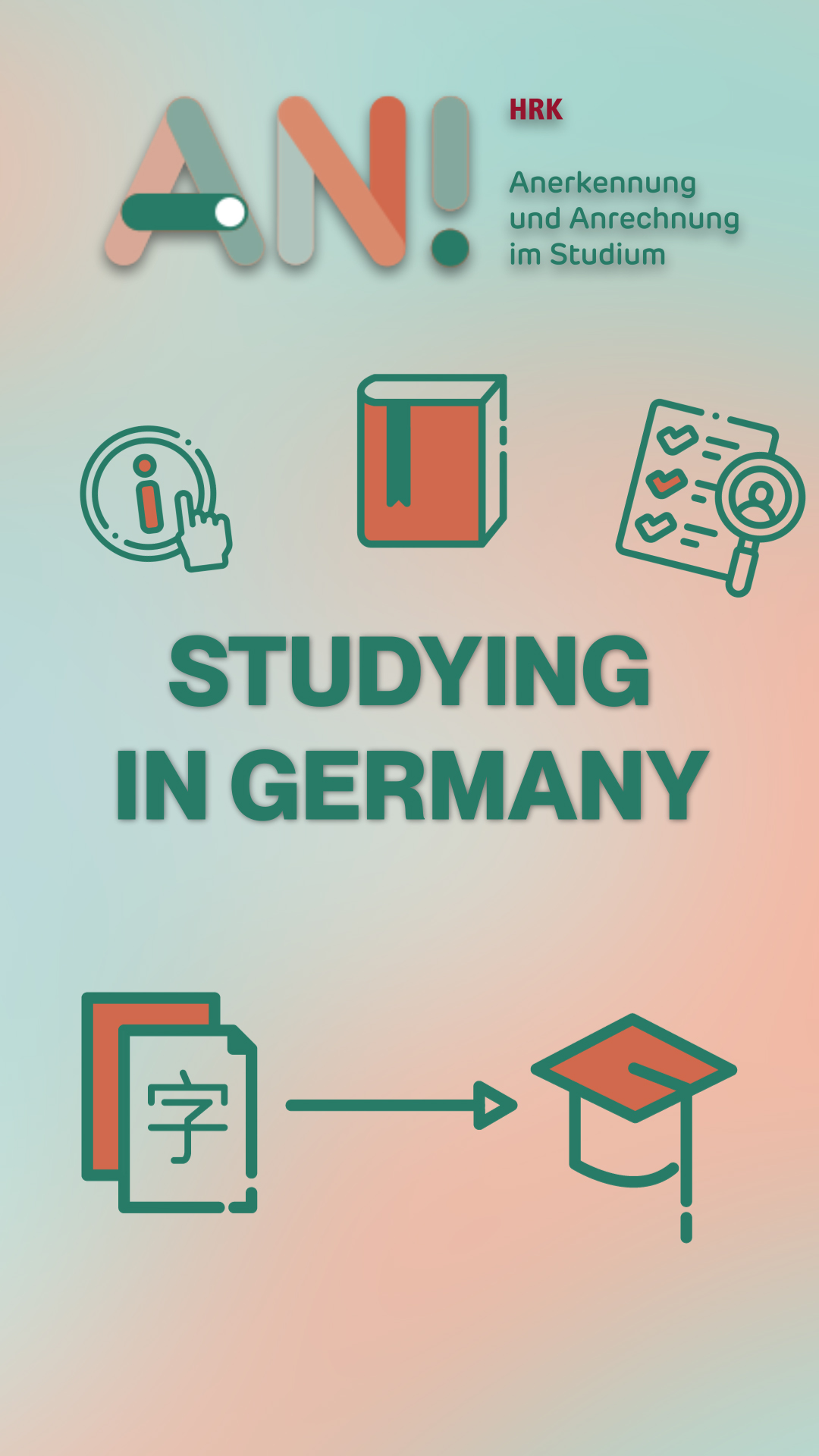- This section on AN! is aimed at people who would like to gain an academic degree in Germany. If you are planning a short-term stay abroad in Germany, e.g. a semester abroad, the requirements of your home university apply. In this case, get in touch with the contact person at your university. If you would like to have your degree from abroad recognised in order to work in Germany, have a look on the Information portal of the German government for the recognition of foreign professional qualifications.
How it works: 3 tips for studying in Germany
Who are your contact persons? What should you consider if you want to study in Germany? Can you have your achievements and competences recognised? Our overview will tell you.
Starting to study in Germany
Step 1: Find the right study programme
- Academic studies in Germany may be structured and organised very differently from studies in your home country. In Germany, for example, there are different types of universities (sometimes referred to as higher education institutions): universities (Universitäten), universities of applied sciences (Hochschulen für angewandte Wissenschaften or Fachhochschulen), universities of the arts (Kunsthochschulen or künstlerische Hochschulen) and universities of cooperative education (duale Hochschulen). There are also around 21,000 study programmes in Germany – but don’t worry: you can find out which programme is offered at which university using the Higher Education Compass, for example.
- Most study programmes follow the bachelor’s and master’s system. A bachelor’s degree is the first university degree that qualifies you for a profession. A bachelor’s programme usually lasts three to four years or to put it another way six to eight semesters. Admission to a master’s programme, which usually lasts one to two years, respectively two to four semesters, usually requires a bachelor’s degree or a comparable qualification.
- In addition to the bachelor’s and master’s programmes, there are other types of degree programmes, e.g. teacher training programmes or degree programmes which lead to a state examination, such as medical studies. You can also find more information about different types of study programmes and types of universities at the Higher Education Compass.
Step 2: Access to study in Germany
- In order to study in Germany, you need a higher education entrance qualification comparable to the German Abitur. This is usually a secondary school-leaving certificate that authorises you to study in Germany. If you come from the European Union, Iceland, Liechtenstein, Norway or Switzerland, your higher education entrance qualification from your country is usually also sufficient for studying in Germany. If you obtained your school-leaving qualification outside the EU or not in one of the other countries mentioned, first clarify whether it qualifies you to study at a university in Germany. Partial studies in your home country may also entitle you to study in Germany. In most cases, you will also need a first degree, usually a bachelor’s degree, to start a Master’s degree programme. The following databases can tell you whether your foreign qualification is sufficient for a particular study programme:
- You can also find general information on university admission in Germany and other important questions on Study in Germany.
- If your secondary school leaving certificate does not qualify you to study in Germany, you have the option of acquiring a higher education entrance qualification after attending preparatory courses at a so-called Studienkolleg and successfully passing an assessment test. Detailed information is available from the German Academic Exchange Service (DAAD).
- In some federal states (North Rhine-Westphalia, Bremen, Brandenburg, Hesse, Saarland and Thuringia), universities can enable international students without a recognised higher education entrance qualification to take up a study programme through an alternative procedure. For example, entrance examinations can be carried out for this purpose. Some universities use the TestAS aptitude test for this purpose. For detailed information on alternative university admission, please contact the university at which you would like to study.
Step 3: Contact the university of your choice
- Once you have decided which study programme you want to apply for at which university, it is best to contact an advice centre at the university where you would like to study. This could be the international office or the central student advisory service, for example. Here you will receive support with questions about university admission, application requirements, deadlines, study programmes and much more.
Further information
- You can find a comprehensive overview of everything you need to know about studying in Germany, admission requirements, funding options and much more at Study in Germany.
- Make it in Germany also shows you how to start and organise your studies in Germany.
- Would you like to start studying in Germany, but have already studied in another country? Perhaps your previous achievements could be recognised. Have a look at the next point.
Continue your studies: Take your achievements with you!
- You have already studied in your home country and have been offered a place to study in Germany? The credits you have already earned at the university do not necessarily have to be lost when you transfer. Your achievements may be recognised, so that you do not have to start all over again.
- Recognition (Anerkennung) means that you do not have to repeat work you have already completed. If your application is approved, you will not have to re-learn what you already know after the transfer and can, for example, shorten your studies or give yourself more time for a part-time job or other interests.
- In principle, the same requirements apply to you as for German students. This means, for example, that you must already be enrolled on a study programme in Germany in order to apply for recognition. You can find basic information on the topic of recognition on our page “From one study programme to another“.
- As higher education qualifications and the structure and content of a study programme can differ greatly in different countries, proving and verifying your achievements and skills from a previous study programme may be more complex than for domestic students. Your university in Germany requires meaningful documents that prove that you actually have the skills that are to be recognised. These can be a transcript of records, module descriptions and certificates, for example. In most cases, these documents must be translated. You can find out which documents you need to submit with your application at your university in Germany.
- It is always the university receiving an application for recognition that decides on it. You can therefore also contact your university in Germany, e.g. the International Office, if you have any questions.
- If you would like to have your degree from abroad recognised in order to work in Germany, have a look on the Information portal of the German government for the recognition of foreign professional qualifications.
Studying in Germany with professional experience
- Have you already completed vocational training in your home country? Or are you in the middle of your career and would now like to study in Germany? In Germany, you have the opportunity to have your professional skills recognised. Recognition of prior learning (Anrechnung) means that the skills you already have can replace parts of your studies, if the competences already acquired and those to be acquired through studying are equivalent. This allows you to shorten your studies, for example, and gives you more time to learn new things, make friends or work part-time.
- You can find out how the recognition of competences acquired outside higher education works at German universities on our page “From work to study“.
- You must already be enrolled on a study programme in Germany in order to apply for your recognition of prior learning (RPL). As the structure of education systems in different countries can vary greatly, comparing your foreign professional qualification with the content of your study programme in Germany may pose challenges. You should note that you must prove to your university in Germany that you actually have the competences that you would like to have recognised. To do this, you need to submit relevant documents, such as work references, certificates from vocational training and curricula from the professional context. These documents must usually be translated. You can find out which documents you need to submit with your application at your university in Germany.
- It is always the university receiving an application for recognition that decides on it. If you are interested in recognition, you can therefore generally contact your university in Germany, e.g. the International Office.
Recognition of foreign professional qualifications:
- AN! is about the recognition of vocationally acquired skills for an academic study programme. If you are instead looking for information on how you can have a foreign professional qualification recognised in Germany in order to work here, take a look at the Federal Government’s information portal on the recognition of foreign professional qualifications.




